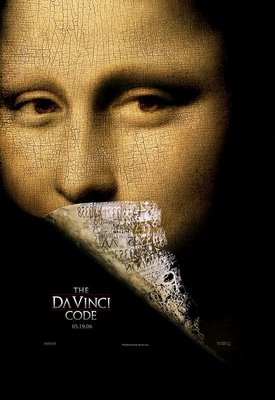 Introduction
Introduction Da vinci code is a well known film in the present times which is based on Dan Brown’s novel published in 2003. Currently over 40 million copies have been sold worldwide. Much heat has been produced, since the release of this film. Some states in India have banned this film.
There are two ways of looking at this film. One is to view this as the most blasphemous film ever released in the history and the other is that it gives a platform for all of us, as believers in Christ Jesus, to discuss / argue / preach the Gospel of Jesus Christ, because it is mostly viewed by people who haven’t really thought about Jesus as God.
I was confronted by two of my friends (unbelievers) regarding the Da vinci code, and I was voluntarily pushed forward to talk about the life / death / resurrection and saving power of Jesus. What an amazing turn around to preach the Gospel of truth to unbelieving friends, in a non-confrontational manner, by using the world famous, blasphemous, Da vinci code.
So, We will see how far Dan Brown’s “facts” will stand up to the historical evidence. Now I am going to explain some of the codes Dan Brown used, as well as the defences, we have against them.
Fiction #1 – Jesus had a private family life
The Da Vinci Code claims that Jesus had family life and that their descendants included a line of kings in France, as well as some of the main characters in the novel.
Explanation: There are no historical documents for this claim. Earliest writings about Jesus’ life are the New Testament Gospels - Matthew/ Mark/ Luke/ John. They were written by disciples of Jesus before 70A.D. The Temple of Jerusalem was destroyed in 70 A.D. as prophesied by Jesus (Matt.24:1, Mark 13:1, Luke 21:5). Since this event was not recorded in any of these 4 gospels, it becomes evident that the Gospels had been written before 70 A.D. Hence they are more accurate and are accepted by the Christians and considered as authoritative.
Fiction #2 - The Gnostic gospels and the Dead Sea Scrolls are "the earliest Christian records."
The Da Vinci Code claims that the New Testament is a forgery and that the Gnostic gospels and the Dead Sea Scrolls are the original Christian texts.
Explanation: Dan Brown’s claim is based, not on the New Testament Gospels, but on Gnostic gospels – e.g. ‘gospel of Philip’, which were written about 150 to 250 A.D. by some unknown authors, who were NEITHER disciples of Jesus NOR friends of any Apostles. They were NOT the true reflections of the Life of Jesus. Hence they are considered to be absolutely fallacious.
On the other hand, the earliest evidence of Jesus’ life is to be seen in the writings of the disciples of Jesus (Matthew/ Mark / Luke / John). They lived & witnessed His life and hence the Gospels written by them are authentic and genuine.
Dead Sea scrolls, which were found in 11 the Qumran caves around 1950, are not the earliest and also they contain very controversial materials.
Fiction #3 – Christianity stole its ideas and concepts from paganism.
The Da Vinci Code, on page 232: claims: "Nothing in Christianity is original. a) The pre-Christian god Mithras - called the Son of God and the Light of the World - was born on December 25, died, was buried in a rock tomb, and then resurrected in three days. b) By the way, December 25 was also the birthday of Osiris, Adonis, and Dionysus. c) The newborn Krishna was presented with gold, frankincense, and myrrh."
Explanation:
a) Even great scholars who have studied about Mithras, do not mention about the death or resurrection of Mithras.
b) As Christians we agree that there’s no mention of December 25th as the birthday of Jesus in the Bible, but this day is simply set to celebrate his birth into this world.
c) There is not a single story in actual Hindu mythology of Krishna being presented with gold, frankincense, and myrrh at his birth.
Hence the sequence of such claims puzzles even the greatest critics and gives raise to the possibility of these claims arising from Dan Brown’s imagination!
Fiction # 4- The sacred name for God has a paganistic origin.
The Da Vinci Code, on page 309, claims: "The Jewish Tetragrammaton YHWH - the sacred name of God - in fact derived from Jehovah, an androgynous physical union between the masculine Jah and the pre-Hebraic name for Eve, Havah"
Explantion:
In reverence, the ancient Jews did not pronounce YHWH, meaning GOD. So, they used a substitute word ADONAH, which means LORD. The two words fused in course of many years to produce a new name YEHOVAH. In essence, the word JEHOVAH is a made-up English word and is not present in the original Hebrew or Greek texts in the Bible. Hence Dan Brown’s explanation is wrong.
Fiction #5 - The Vatican killed an "astounding 5 million women" during the witch hunts
Explanation:
History records that the witch hunts were done by local governments and not Vatican.
Fiction #6 - Emperor Constantine shaped the New Testament.
The Da Vinci Code claims that Constantine replaced the Gnostic writings with what we now call the New Testament.
Expanation:
Constantine lived between 306A.D. and 337 A.D. But 24 of the 27 books that are part of today's New Testament were already regarded by early Christians as being authoritative, which is about 213 years before Constantine.


